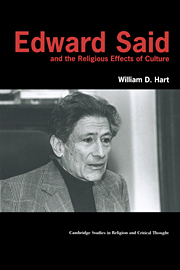Book contents
- Frontmatter
- Contents
- Preface
- Abbreviations
- Preliminary remarks
- 1 Culture as the transfiguration of religious thought
- 2 The religious effects of culture: nationalism
- 3 The religious effects of culture: Orientalism
- 4 The religious effects of culture: imperialism
- 5 The responsibilities of the secular critic
- 6 Marx, Said, and the Jewish question
- Concluding remarks: religion, secularism, and pragmatic naturalism
- Appendix A Whose exodus, which interpretation?
- Appendix B An exchange of letters between Michael Walzer and Edward Said
- Notes
- Select bibliography
- Index of names
Appendix B - An exchange of letters between Michael Walzer and Edward Said
Published online by Cambridge University Press: 22 September 2009
- Frontmatter
- Contents
- Preface
- Abbreviations
- Preliminary remarks
- 1 Culture as the transfiguration of religious thought
- 2 The religious effects of culture: nationalism
- 3 The religious effects of culture: Orientalism
- 4 The religious effects of culture: imperialism
- 5 The responsibilities of the secular critic
- 6 Marx, Said, and the Jewish question
- Concluding remarks: religion, secularism, and pragmatic naturalism
- Appendix A Whose exodus, which interpretation?
- Appendix B An exchange of letters between Michael Walzer and Edward Said
- Notes
- Select bibliography
- Index of names
Summary
THIS IS A REPRODUCTION OF “AN EXCHANGE: MICHAEL WALZER AND EDWARD SAID,” GRAND STREET 5:4 (1986), 246–259. (REPRODUCED WITH THE PERMISSION OF EDWARD W. SAID)
To the editor:
People don't always get the political enemies they want. Edward Said seems particularly unsatisfied in this respect, and so he has set out to make up his enemies to suit himself (“Walzer's Exodus and Revolution: A Canaanite Reading,” Grand Street, Winter 1986). His materials are my own books and articles, everything I have written, in fact, since the watershed year of 1967. I am willing enough to play the part that Said assigns me, but I am not willing to play it according to his script – even if the script is put together out of bits and pieces of my own sentences. I prefer my sentences whole; my politics too. The enemy Said wants is the precise opposite of the self he would like to be: as he is in his mind's eye cool, detached, skeptical, alienated, secular, and universalistic, the very model of a modern intellectual, so I am to be warm, sentimental, mystical, complacent, religious, and parochial, a case study in the treason of the intellectuals. But I won't play.
Rereading Said's The Question of Palestine, I am inclined to think that he is his own best enemy: he doesn't need me. But I do make it possible for him to recognize a problem, even if he can't acknowledge that it's his problem too.
- Type
- Chapter
- Information
- Edward Said and the Religious Effects of Culture , pp. 187 - 199Publisher: Cambridge University PressPrint publication year: 2000



